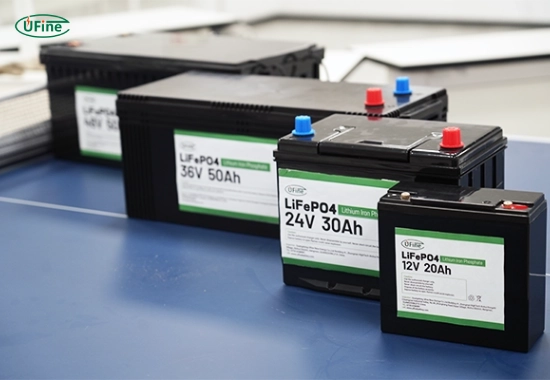
- Part 1. What is a heavy-duty battery?
- Part 2. What makes a lithium battery different from traditional batteries?
- Part 3. Can a lithium battery be heavy-duty?
- Part 4. How do lithium batteries perform under heavy load?
- Part 5. How long does a heavy-duty lithium battery last?
- Part 6. Are lithium batteries safe for demanding use?
- Part 7. What are the key benefits of using lithium for heavy-duty power?
- Part 8. What should I look for in a heavy-duty lithium battery?
- Part 9. Can I replace my old battery with a lithium one?
- Part 10. Where are heavy-duty lithium batteries used today?
- Part 11. FAQs about heavy-duty lithium battery
Can a lithium battery be heavy-duty? Yes, a lithium battery can be heavy-duty. Today’s lithium battery technology has advanced so it can handle demanding tasks like traditional batteries and often perform even better. If you wonder whether a lithium battery qualifies as heavy-duty, the answer is a confident yes. This article will explore what makes a battery heavy-duty, how lithium batteries measure up, and why they are becoming the preferred choice for commercial and personal use.
Part 1. What is a heavy-duty battery?
A heavy-duty battery is designed for high-performance applications. It is built to deliver strong and stable power over long periods and under harsh conditions. These batteries are commonly used in vehicles, industrial tools, backup systems, RVs, boats, and solar setups. “heavy duty” refers to the battery’s ability to withstand high power demands, frequent deep discharges, and harsh environments such as extreme temperatures or constant vibration.
Heavy-duty batteries must be reliable, durable, and capable of recharging quickly. Traditionally, lead-acid batteries have been used for heavy-duty applications. However, with the rise of lithium technology, more people are turning to lithium batteries for their superior performance.
Part 2. What makes a lithium battery different from traditional batteries?
Lithium batteries, especially lithium iron phosphate (LiFePO4) types, offer a range of advantages over traditional lead-acid or AGM batteries. They are lighter in weight, have a longer lifespan, charge faster, and provide more usable capacity.
A lithium battery’s structure is also different. It includes a built-in Battery Management System (BMS) that intelligently monitors and controls the battery’s performance. This technology protects against overcharging, deep discharging, overheating, and short-circuiting.
Lithium batteries also have a higher depth of discharge, meaning you can use up to 100 percent of their capacity without damaging the battery. In contrast, traditional batteries should not be discharged below 50 percent to avoid reducing their lifespan.
Part 3. Can a lithium battery be heavy-duty?
Yes, lithium batteries can absolutely be heavy-duty. In fact, many lithium batteries are now designed specifically for high-load, heavy-duty use. They can deliver strong, consistent power to demanding devices and systems.
Lithium batteries can handle high discharge rates, essential when running large appliances or heavy machinery. They also recover quickly and can be recharged faster than conventional batteries. This makes them ideal for daily use in environments where power is critical.
Many users who need reliable and long-lasting power are now switching to lithium solutions. These batteries are used in RVs, boats, off-grid cabins, and solar energy systems. They are also adopted in commercial settings such as construction sites and industrial equipment.
Part 4. How do lithium batteries perform under heavy load?
Lithium batteries are known for maintaining voltage even when powering demanding equipment. Lithium batteries deliver consistent energy throughout the discharge cycle, unlike lead-acid batteries, which can suffer from voltage drop during heavy use.
This makes them ideal for systems that require a steady power supply. Whether you are running an air conditioner in your camper van, high-powered tools on a job site, or a bank of solar panels in an off-grid home, lithium batteries are up to the task.
Because of their high efficiency, lithium batteries waste less energy as heat and charge more completely. This ensures that the battery performs reliably and safely even under heavy load.
Part 5. How long does a heavy-duty lithium battery last?
One of the most significant advantages of lithium batteries is their long lifespan. A quality lithium battery can last between 2000 and 5000 charge cycles, depending on how it is used and maintained. This represents several years, or even a decade, of regular use.
In comparison, traditional lead-acid batteries typically last 300 to 500 cycles. This means you would need to replace a lead-acid battery multiple times over the life of a single lithium battery.
For users who rely on power daily, such as in RVs, boats, or work vehicles, this longer lifespan translates into fewer replacements, less downtime, and more cost savings in the long run.
Part 6. Are lithium batteries safe for demanding use?
Lithium batteries are engineered with safety in mind, especially when used in heavy-duty scenarios. The built-in Battery Management System plays a key role in ensuring safe operation. It monitors temperature, voltage, and current and automatically shuts down the battery if unsafe conditions are detected.
In addition, LiFePO4 batteries are chemically stable and resistant to thermal runaway, which makes them safer than other lithium chemistries. They do not overheat easily and are less likely to catch fire or explode.
For heavy duty applications, where safety is critical, these features provide peace of mind. Whether used in mobile setups or fixed installations, lithium batteries offer high protection.
Part 7. What are the key benefits of using lithium for heavy-duty power?
There are several reasons why lithium batteries are becoming the top choice for heavy-duty use:
- Lightweight: Lithium batteries weigh about half as much as lead-acid batteries. This reduces strain on vehicles and makes installation easier.
- Longer lifespan: Thousands of cycles mean years of reliable service.
- Low maintenance: No need for water refilling or equalization charging.
- Faster charging: Spend less time waiting for batteries to recharge.
- High energy efficiency: More of the stored energy is usable.
- Safe operation: Advanced BMS systems add an extra layer of protection.
- Compact design: Save space while getting more power.
These benefits make lithium batteries a smart investment for anyone who needs reliable energy for demanding tasks.
Part 8. What should I look for in a heavy-duty lithium battery?
When selecting a lithium battery for heavy-duty use, consider the following features:
- Capacity in amp-hours (Ah): Choose a battery that matches your daily power needs.
- Voltage output: Ensure it is compatible with your system (12V, 24V, or 48V).
- Discharge rate: Use a high continuous current rating to handle your load.
- Cycle life: A higher number of cycles means better long-term value.
- Temperature tolerance: Ensure it performs well in your climate.
- Warranty and support: A good warranty shows the manufacturer stands by their product.
If unsure, consult a battery specialist or supplier who understands heavy-duty applications.
Part 9. Can I replace my old battery with a lithium one?
Yes, in most cases, you can replace your existing lead-acid battery with a lithium battery. Many lithium models are designed to be direct replacements. However, there are a few things to keep in mind:
- Verify the voltage compatibility.
- Ensure your charging system is suitable for lithium batteries.
- Check that your space and wiring can accommodate the new battery.
Once installed, you will notice the difference immediately. Your system will become lighter, more efficient, and more powerful.
Part 10. Where are heavy-duty lithium batteries used today?
Heavy-duty lithium batteries are used across many industries and applications. Some common uses include:
- Recreational vehicles (RVs): Powering fridges, lights, and entertainment systems.
- Boats and yachts: Managed onboard systems, including navigation and engine start.
- Solar energy storage: Holding energy generated by off-grid solar panels.
- Construction equipment: Running heavy tools and machinery.
- Medical and emergency backup systems: Providing reliable power when needed.
Their durability and performance make them a trusted choice in areas where power is critical, and failure is not an option.
Part 11. FAQs about heavy-duty lithium battery
What makes a battery heavy-duty?
A heavy-duty battery is built to provide reliable power in harsh conditions. It can handle large loads, deep discharges, and frequent use without performance loss.
Are lithium batteries better than traditional ones for heavy-duty tasks?
Lithium batteries offer better performance, longer life, and greater efficiency than lead-acid or AGM batteries.
Do lithium batteries work in cold weather?
Many lithium batteries work well in colder climates. Some models include internal heaters or low-temperature cutoffs for added protection.
Is it safe to use lithium batteries every day?
Absolutely. Lithium batteries are designed for daily cycling and long-term use, especially when equipped with a proper BMS.
How much do heavy-duty lithium batteries cost?
While initial costs are higher, lithium batteries offer better value over time due to their long lifespan and low maintenance needs. Prices vary based on capacity and brand.
Are you thinking about upgrading your power system? A lithium heavy-duty battery may be perfect if you need reliable, strong, and lasting energy. Lithium can handle the load whether you’re powering a mobile lifestyle, an off-grid home, or heavy equipment. Choose smart, choose safe, and select performance. It’s time to experience what modern energy can do for your life.
Related Tags:
More Articles

What are Watts and Watt Hours in Battery?
Understand watt vs watt-hour in batteries, how to calculate battery watt hours, and what Wh means for car batteries, devices, and energy storage.
A Complete Guide to the Best Batteries for Flashlights
Compare the best batteries for flashlights, including AA, AAA, 18650, 21700, CR123A. See which battery offers the best brightness, runtime, and reliability.
How Long Do Rechargeable AA Batteries Last?
How long do rechargeable AA batteries last? Compare NiMH and lithium AA lifespan, recharge cycles, key factors, and performance vs alkaline batteries.
How Much Current Can a 9V Battery Really Supply?
Discover how many amps a 9V battery can supply, its actual current output, discharge rate, and capacity for alkaline, lithium, and rechargeable 9V batteries.
12V STD vs 12V AGM: Meaning, Differences, and Which Is Better
Understand what STD and AGM batteries mean, their key differences, and which 12V battery fits your needs best in 2026.



